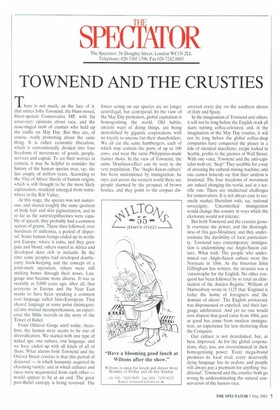TOWNEND AND THE CRUSTIES
There is not much, on the face of it, that unites John Townend, the blunt-nosed, blunt-spoken Conservative MP, with his unsavoury opinions about race, and the nose-ringed mob of crusties who held up the traffic on May Day. But they are, of course, really protesting about the same thing. It is called economic liberalism, which is conventionally divided into four freedoms of movement: of goods, people, services and capital. To set their worries in context, it may be helpful to consider the history of the human species over, say, the last couple of million years. According to the 'Out of Africa' theory of human origins, which is still thought to be the most likely explanation, mankind emerged from somewhere in the Rift Valley.
At this stage, the species was not numerous, and shared roughly the same quotient of body hair and skin pigmentation, and in so far as the australopithecines were capable of speech, they probably had a common system of grunts. There then followed, over hundreds of millennia, a period of dispersal. Some human beings ended up in northern Europe, where it rains, and they grew pale and blond: others stayed in Africa and developed skins rich in melanin. By the time some peoples had developed doubleentry book-keeping and the concept of a joint-stock operation, others were still sticking bones through their noses. Language also became more diverse. It was as recently as 5,000 years ago, after all, that everyone in Europe and the Near East seems to have been speaking a common root language called Indo-European. That shared language at some point disintegrated into mutual incomprehension, an experience the Bible records in the story of the Tower of Babel.
From Olduvai Gorge until today, therefore, the human story seems to be one of diversification. We started with one type of naked ape, one culture, one language, and we have ended up with all kinds of all of them. What alarms both Townend and the Oxford Street crusties is that this period of dispersal — in which humanity acquired its charming variety, and in which cultures and races were sequestered from each other — would appear to be at an end. The great post-Babel entropy is being reversed. The forces acting on our species are no longer centrifugal, but centripetal. In the view of the May Day protesters, global capitalism is homogenising the world. Old habits, ancient ways of doing things, are being demolished by gigantic corporations with no loyalty to anyone but their shareholders. We all eat the same hamburgers, each of which may contain the parts of up to 100 cows, and wear the same Philippines-made trainer shoes. In the view of Townend, the same Moulinex-effect can be seen in the very population. The 'Anglo-Saxon culture' has been undermined by immigration, he says; and across the western world there are people alarmed by the prospect of brown hordes, and they point to the corpses dis covered every day on the southern shores of Italy and Spain.
In the imagination of Townend and others, it will not be long before the English stock all starts turning coffee-coloured, and, in the imagination of the May Day crusties, it will not be long before the global coffee-shop companies have conquered the planet in a tide of identical macchiato, recipe locked in Seattle, profits to the gnomes of Wall Street. With one voice, Townend and the anti-capitalist mob cry, 'Stop!' They scrabble for a way of arresting the cultural mixing machine; and one cannot honestly say that their analysis is irrational. The four freedoms of movement are indeed changing the world, and at a terrific rate. There are intellectual challenges for conservatives. It is not always easy to reconcile market liberalism with, say, national sovereignty. Uncontrolled immigration would change this country in ways which the electorate would not tolerate.
But both Townend and the crusties grossly overstate the power, and the thoroughness of this geo-Moulinex: and they underestimate the durability of local particularity. Townend says contemporary immigration is undermining our Anglo-Saxon culture. What tosh. The people who undermined our Anglo-Saxon culture were the Normans in 1066. As the historian John Gillingham has written, the invasion was a 'catastrophe for the English. No other conquest has been followed by so total an elimination of the Ancien Regime.' William of Malmesbury wrote in 1125 that 'England is today the home of foreigners and the domain of aliens'. The English aristocracy was dispossessed or expelled, and their language adulterated. And yet no one would now dispute that good came from 1066, just as good has come from modern immigration, an experience far less shattering than the Conquest.
Our culture is not demolished, but, at best, improved. As for the global corporations, they, too, are overestimated in their homogenising power. Every mega-brand produces its local rival; every deservedly dying language has its zealots; and people will always pay a premium for anything 'traditional'. Townend and the crusties both go wrong by underestimating the natural conservatism of the human race.










































































 Previous page
Previous page